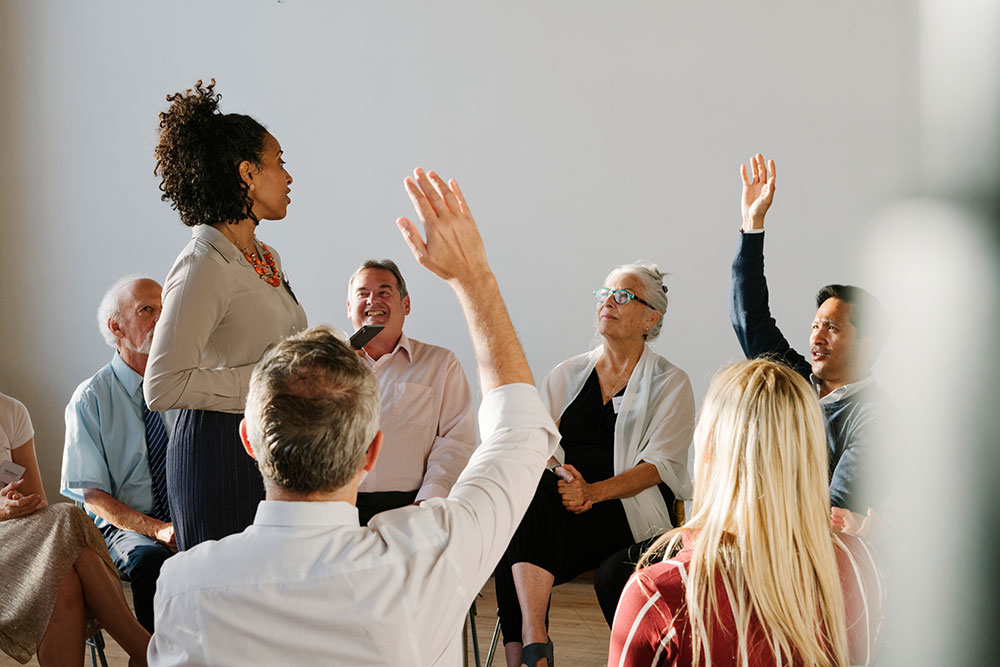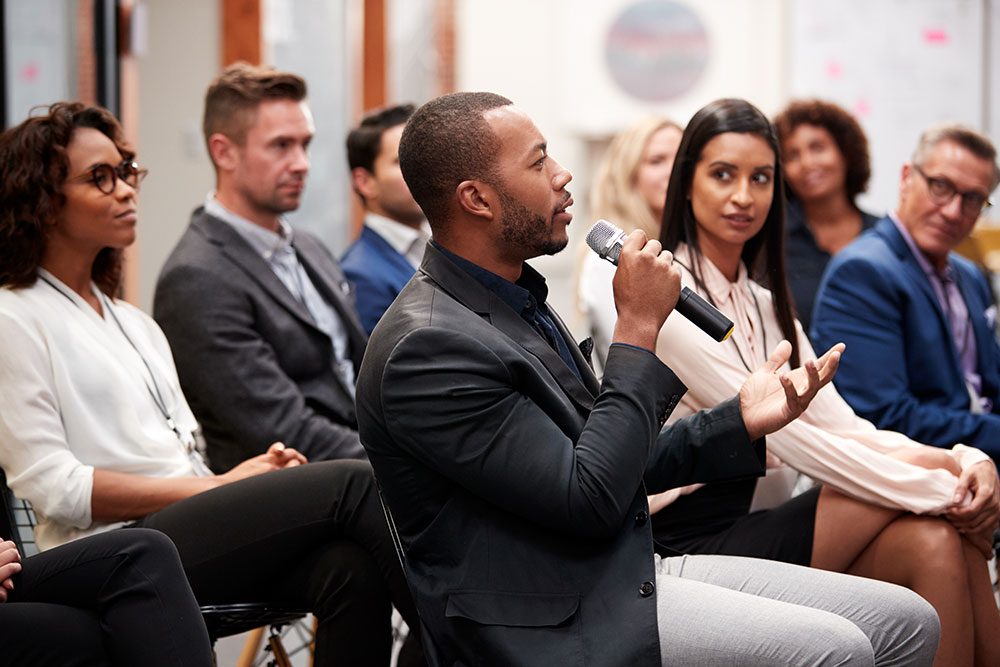Pre-Institutes
Arrive early and attend a Pre-Institutes Training Program on July 6 and 7, 2025. Each of the six Pre-Institutes are designed to support participants in the acquisition of essential skills, tools, resources, knowledge, or certification pertaining to the field. Multiple presenters for each Pre-Institute ensures relevant, in-depth training with plenty of time for interaction, participation, and questions. Build core skills in such areas as leadership or strategic marketing, or obtain certification in a foundational framework like FAN (Facilitating Attuned Interactions). Attend Pre-Institutes with your team or on your own. Meet new colleagues, participate and learn, and leave with new skills.
Each Pre-Institutes Training Program will span 1.5 to 2 days with a registration fee of $695. The fee includes all materials, daily breakfast, refreshments, and lunch.
Pre-Institute #1: Certification in Facilitating Attuned Interactions (FAN) Level 1
Presenters:
Training by Kate Sweeney, MSW, LCSW-C, with facilitation by Margo Candelaria, PhD
Innovations Institute, University of Connecticut, School of Social Work
Introduction
This Pre-Institute is designed for people involved in direct service with families and those that supervise staff who provide direct services to children and families. Participants who engage in the full offering will receive a certificate for FAN Level 1 Training, making them eligible for FAN Level 2 supervision and certification.
The FAN (Facilitating Attuned Interactions) model, developed out of the Erikson Institute, is a conceptual model and practical tool for building relationships and reflective practice. Developed in 2005 as an approach to working with parents of fussy babies, FAN is a meta-framework that is not model specific and is generalizable to helping relationships in many settings.
The theory of change guiding FAN is based on the concept of attunement, defined as an individual's sense of feeling connected and understood. FAN is both a conceptual framework and a practical tool for achieving attunement in relationships and reflective practice.
FAN is more than a typical training. Rather, it is an approach to building better relationships between professionals and families, and ultimately between families and their children, because it helps providers adapt to clients’ needs in the moment and stay emotionally in tune. It also helps professionals reflect on the meaning of a client’s behavior and find more compassion for themselves through self-regulation. As a result, professionals feel more effective in their work and parents are ready to read their children’s cues and know how to respond to their needs.
Learning Objectives
As a participant you will:
- Learn about this conceptual model and practical tool for family engagement and reflective practice.
- Improve your ability to read caregivers’ cues and respond with interventions that match what parents and families most need moment-to-moment.
- Recognize and regulate your own feelings when working with families to build your reflective capacity.
- Improve the relationship you have with families that are harder to engage.
- Enhance your ability to provide attuned developmental information in a way that increases parental/family capacity.
- Learn how FAN can be utilized as a framework and a structure for reflective supervision.


Pre-Institute #2: Family Peer Specialist Through the Lifespan
Presenters:
Lynda Gargan, PhD, Executive Director
Dana LaBranche, MA, National Certification Manager
Lachelle Wade Freeman, MA, Project Manager
Gail Cormier, MS, Project Director, National Family Support Technical Assistance Center
National Federation of Families
Introduction
This training is recommended for family members with lived experience as a caregiver who are considering entering the peer workforce; family peer specialists wishing to expand their field of knowledge to include family lifespan support; individuals who may have some training and wish to have a deeper understanding; family peer supervisors; and family support community members.
As the definition of family peer support evolves, the skills needed for family peer specialists (FPSs) to effectively support families and caregivers are expanding. Family-run organizations, Certified Community Behavioral Health Clinics (CCBHCs), Wraparound teams, and other community organizations employing FPSs must grow their peer workforce to include staff with lived experience who are capable of supporting families from birth through adulthood.
As a child grows into young adulthood, the needed services, systems, and legal frameworks that support families with minor children change significantly. Parents and caregivers supporting their now-adult children must navigate adult systems, and the support provided by an FPS must be broad and adaptable to support all age groups.
Based on the National Family Support Technical Assistance Center’s self-paced virtual curriculum, "Family Peer Specialist Through the Lifespan" (FPS 101), this hands-on, in-person 1.5-day training will equip FPSs and the family peer workforce with the skills and tools they need to support families who are navigating child- and family-serving systems in their communities. This training incorporates best practice competencies to enhance the skills of family peers, enabling them to better serve families supporting loved ones experiencing mental health and/or substance use challenges.
Participants in this Pre-Institute have the unique opportunity to receive in-person training from seasoned family experts in five topic areas. This interactive training includes breakouts, roleplays, videos, and games to evaluate knowledge. Participants will acquire cutting-edge skills that reflect the evolving demands on FPS in 2025 and beyond.
Learning Objectives
As a participant you will:
- Gain expanded skills to support families from birth to adulthood.
- Be able to define the expanded SAMHSA and National Federation of Families’ definition of "family" and “family peer support” across the lifespan.
- Learn to translate your individual supports and experiences into strategies and tools to support others throughout the lifespan.
Notes: This training does not prepare individuals for the National Federation of Families National Certified Family Peer Specialist exam. However, completion of this training can be submitted as part of the application requirements.

Pre-Institute #3: Bridging the Gap: Practical Implementation Skills for Successful Practice Change
Presenters:
Angela Weeks, DBA
Marlene Matarese, PhD
Elizabeth Greeno, PhD
Deborah Harburger, MSW
Darquita Fletcher, MSW
Innovations Institute, University of Connecticut, School of Social Work
Introduction
This Pre-Institute is designed for people involved in or responsible for implementing new practices and interventions in their organizations. Participants should come with a practice or intervention that they will be part of implementing in their organization.
We have all been part of launching a great idea that didn’t quite stick or a program that didn’t deliver anticipated outcomes. Adopting and integrating new evidence-based and emerging best practices and interventions into direct service settings can be challenging. One strategy to address the challenges we encounter is to set up effective implementation strategies that can ensure sustainable and meaningful change. This Pre-Institute will equip participants with essential skills and tools needed for successful implementation. Participants will learn practical strategies, explore real-world case studies, and engage in interactive activities designed to enhance their implementation capabilities. Presenters will explore key principles and frameworks of implementation science as well as step-by-step approaches for planning and executing implementation efforts. The group will participate in practical exercises using real-world examples with time for participants to apply what they learn in developing their own implementation plans.
A critical companion to any implementation is an evaluation plan. Presenters will highlight different types of evaluation and continuous quality improvement efforts. Discussions and activities will focus on usability testing, rapid cycle improvement strategies including plan-do-study/check-act cycles, and fidelity. Participants will learn how to use these data to make improvements in process, practice, coaching, and supervision. Presenters will guide participants to think through sustainability plans as part of their implementation planning. There will be opportunities to practice using different tools and resources as well as opportunities for peer learning and collaboration to solve implementation challenges and share insights throughout the session.
Learning Objectives
As a participant you will:
- Understand the foundations of implementation science.
- Develop practical implementation strategies.
- Practice developing implementation plans.
- Learn step-by-step approaches for planning and executing implementation efforts.
- Identify common barriers to implementation and strategies to overcome them.
Pre-Institute #4: Adaptive Leadership for Systems Change
Presenters:
Ellen Kagen, MSW, PCC, Kagen Leadership Group
Gary Blau, PhD, Executive Director Emeritus, The Hackett Center, Senior Fellow for Children's Mental Health, Meadows Mental Health Policy Institute
Johanna Bergan, Program Manager, Innovations Institute, University of Connecticut School of Social Work
Introduction
Anyone is welcome to participate in this Pre-Institute. Participants are encouraged to come with colleagues and partners to understand collectively the nature of adaptive leadership where everyone has a responsibility to lead from any chair.
Do you want to build your leadership skills and effectively promote systems change? If your answer is yes, then this Pre-Institute is designed for you!
Leadership has long been seen as the job of the person at the top. However, we know that leadership occurs at all levels of an organization and is a necessary function for systems to change. This two-day Pre-Institute, based on the highly acclaimed Georgetown Leadership Academy, will focus on the framework, skills, and tools necessary to support system partners, professionals, and families at all levels and stages of experience in their roles as leaders in systems change. Together we will define adaptive leadership skills and identify change processes needed to overcome resistance and complacency and to successfully navigate the process of change. Every leader has a unique, nuanced, and personal journey, and this Pre-Institute is designed to touch the heart, stimulate the mind, and develop specific skills and attitudes associated with successful leadership.
The role of leadership in building systems of care is to create a safe space for individuals to learn, adapt, and implement important new ideas, values, and behaviors over time. This framework requires that leaders be strategic and focused in their role as change agents and that they differentiate their leadership behavior between adaptive work (which helps align values and perspectives, create energy, and foster implementation) and technical work (where perspectives are already aligned and management skills such as delegation, planning, tracking, reporting, and determining corrective actions are needed). Participants will be exposed to the adaptive leadership tools of Values Bumping and The Reverse View as well as Case Consultation Protocol to apply within your teams.
This highly interactive curriculum looks at leadership from the inside out and provides the opportunity to reflect on who you are as an agent of change. Participants will engage in a dynamic and honest conversation about the nature and role of adaptive leadership in often complex, emotionally charged, and difficult environments. Attendees will emerge from this training with new ways of understanding the roles they play either with or without authority, improve one’s adaptive leadership skills and practices, and develop the ability to apply those skills with confidence and intention.
Learning Objectives
As a participant you will learn to:
- Distinguish the difference between the multiple functions required as an agent of change.
- Identify the leadership role in adaptive work that requires shifts in values, beliefs, and habits of behavior.
- Implement adaptive leadership skills that support a change agent role.
- Identify and apply individual values, mindsets, mental models, and leadership practices that may need to be reset to improve as an agent of change.


Pre-Institute #5: Develop an Impactful Marketing Plan: Strategic Communications for Public Services
Presenters:
Michelle Boardman, MBA, Innovations Institute, University of Connecticut, School of Social Work
Introduction
This Pre-Institute is designed for individuals or teams seeking to understand marketing for programs, services, or initiatives for children, youth, young adults, and their families. The training program will help individuals or teams raise awareness and build audiences for their programs. Attendees do not need to have prior marketing experience.
Marketing is, at its core, the work of engaging with the people you are trying to reach through your programs or initiatives. Often our work across organizations to support the needs of youth and their families is done by a dedicated, skilled team that may or may not include trained marketing professionals. Whether you and your team have extensive marketing experience or are just beginning the work of engaging your key audiences, this workshop is for you.
Presenters will introduce a model for impactful marketing whereby participants will learn the steps involved in planning and executing a marketing strategy to successfully reach an audience. Learn to raise awareness of your program, increase participation and attendance, and evaluate your efforts to ensure success. Discover how to research your audience, identify where they get information, develop short-form and long-form communications that speak to your audience, and create engaging graphics and imagery that grab attention and speak to the audience. Understand how to execute your plan in the places where your audience is most likely to encounter your messages including events, social media, websites, partner communications, and much more.
Marketing is most successful when the team developing the plan includes youth and family members; their insights on messaging, graphics, and how to reach your audience are critical. This approach ensures your marketing efforts will speak to the needs of your audience. Hear case studies of marketing efforts and learn how to evaluate your own efforts. Bring your team to this two-day hands-on workshop and collaboratively develop your plan and messages with input from the instructors and other attendees. Leave with the skills and knowledge to build and engage your audience.
Learning Objectives
As a participant you will:
- Use a comprehensive model for planning and executing a marketing strategy.
- Improve your understanding of the steps involved in engaging their audience.
- Establish realistic marketing goals tied to your business/program goals.
- Research your audience to learn how best to communicate with them.
- Understand how to best involve youth and families in marketing efforts.
- Write marketing messages that combine both what you need to communicate and what your audience needs or wants to hear.
- Identify the best means for reaching your audience and develop skills in partner marketing, event marketing, and web and social media marketing.
- Learn to evaluate and adjust your marketing efforts as the plan unfolds to ensure successfully reaching their goals.
Pre-Institute #6: The Coach Approach to Adaptive Leadership within Systems of Care
Presenters:
Monica McCall, PhD, Coach Approach Partners
Marc Durgin, SOC Project Director, PA Care Partnership
Introduction
Participants in this Pre-Institute will embark on a transformative journey that introduces them to a vital coaching mindset and skillset. They will actively engage in skill-based exercises using their own real-world challenges. By addressing genuine issues, participants experience the power and value of leadership coaching and of building a coaching culture. System partners, family leaders, and youth leaders are encouraged to attend.
The Coach Approach to Adaptive Leadership is an interactive experience designed to enhance leadership supervision and practices within systems of care. As states and communities aim for growth and long-term sustainability, leadership coaching is a culture-building mindset and skillset that will enhance workforce effectiveness. The underlying premise of the Coach Approach is that people are capable and competent, and they can solve their own challenges with support – the same premise that underlies systems of care.
In this highly engaging, experiential, and skill-based Pre-Institute, you will learn and practice the mindset and skills necessary to enhance internal and cross-system collaboration and communication, boost accountability, and build feedback and engagement into your daily interactions, including one-on-one supervision, team meetings, and cross-agency interactions. This Coach Approach framework is specifically designed to support these goals in a safe, supportive learning environment. The Coach Approach is more than another tool – it’s a “way of being” using the mindset and skillset which can change the conversation and move the challenging work of systems change forward.
The Coach Approach to Adaptive Leadership aims to equip participants with a coaching model while offering practical opportunities to build coaching cultures within systems of care. This approach is customized to the unique needs of each person and each organization and can be applied to all levels within a system – from frontline workers to senior leaders.
Learning Objectives
As a participant you will:
- Enhance systems of care by fostering adaptive leadership, trust, and effective communication.
- Strengthen cross-agency collaboration and partnerships between families, youth, and system leaders.
- Cultivate communication and critical thinking skills within teams.
- Empower others through collaborative problem-solving and leadership coaching.
- Build a culture of trust, psychological safety, and accountability in daily interactions.
- Promote presence, active listening, and powerful questioning to address leadership challenges.
- Support interpersonal effectiveness and collaboration both at work and home using the Coach Approach.

CECs
As an attendee of a Pre-Institute Training Program, you can earn new continuing education credits (CECs).
We are submitting applications for Continuing Education Credits (CECs) for Social Work through the University of Connecticut School of Social Work. The University of Connecticut School of Social Work is approved by the Connecticut Department of Public Health to provide CECs for social workers. Applications will be submitted once the conference agenda has been finalized and we anticipate that participants will be able to receive up to 25.5 CECs by participating in the Pre-Institutes and Training Institutes. The estimated number of CECs may change pending the approval process.
*Continuing education requirements vary from state to state. Many state boards grant reciprocity with national accrediting organizations and other state boards. It is the responsibility of each professional to understand the requirements for license renewal or check with the state or national licensing board and/or professional organization to become more familiar with their policies for acceptable continuing education credit. Social workers should contact their regulatory board to determine course approval.